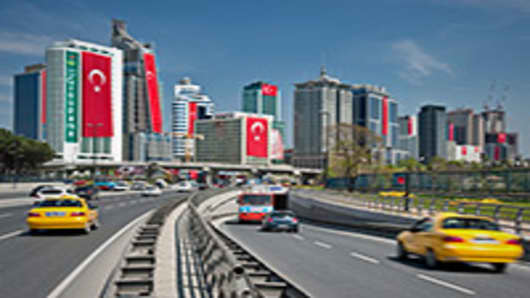The history of Turkey’s bid to join the European Union (EU) is as long and convoluted as a Turkish epic poem, and this seems unlikely to change any time soon.
“For the 25 years I’ve been in Turkey, EU accession has been 10 years away,” said Hugh Pope, Turkey/Cyprus project director of Crisis Group. “At the moment, the process is dead in the water. That doesn’t mean it can’t be revived.”
For many years, the prospect of Turkey joining the EU was not taken very seriously, despite its geographic proximity and membership in NATO. Then, at the turn of the 21st century, Turkey embarked on a series of economic and political reforms, such as the abolition of the death penalty and reforms in the area of women’s rights, which would make it more palatable to EU members.
In 2005, it started formal negotiations to enter the group of nations. These stymied on the old bugbear of Cyprus, a Mediterranean island that both Greece and Turkey have fought over.
[MORE ON CNBC.COM… Slideshow: Investing in Turkish Art ]
Turkey promised to normalize trading relationships with the Republic of Cyprus – the Greek part of the island – and support a unified Greek and Turkish Cyprus in return for moving closer to EU accession. Greek Cypriots ultimately didn’t want to play ball and rejected unification in a referendum.
“The Greek Cypriots got away with a fast one,” Pope said. “The EU made a colossal mistake in not barring them — but some states didn’t want Turkey coming into the EU anyway.”
Cyprus was admitted to the EU in 2004. It has become one of the most troubled member states during the current crisis, and has just had to bail out its heavily indebted banks. The island state is currently looking for aid from both Russia and its European partners.
Any further negotiations between Turkey and the EU have been put on hold at least until after Cyprus’s Presidency of the EU ends in January 2013. In the interim, Turkey has pursued closer ties with its neighbors in the Middle East.
“It’s all about the process and being invited to join,” Pope argued. “In many ways, Turkey already is an EU state. Foreign direct investment and tourism are dominated by the EU, and there’s a big Turkish diaspora there already.”
"Turkey is changing, the EU is changing and the new Europe cannot be without Turkey."
Close to half of Turkish exports are to the EU. There are around 2.5 million Turkish passport holders living and working in the EU at the moment — mainly in Germany, where they have been a traditional source of cheap labor. Migration has slowed in recent years because of the crisis in the euro zone, but there is still a sizeable Turkish diaspora on the continent.
One of the main factors which could bring Turkey closer to EU membership is the change of power in France. When Nicolas Sarkozy was President, he wanted Turkey to accept a form of partnership with the EU, rather than full membership.
After he was replaced by President Francois Hollande, Turkish politicians seemed more eager to return to the table.
"Turkey is changing, the EU is changing and the new Europe cannot be without Turkey," Egemen Ba?is, the Turkish minister in charge of EU affairs said after Hollande’s election. "Until now, all countries that have started negotiations with the EU have become full members. Turkey will not be the first exception."
[MORE ON CNBC.COM: Investing in Europe’s Fastest-Growing Economy ]
There is still a huge wealth gap between Turkey and EU member states. Turkey’s GDP per capita was around $13,600 in 2010, compared to $28,500 in Greece, one of the euro zone’s weaker states.
“Turkey needs a much higher GDP per capita and more reforms before it can seriously think about it (EU membership),” Pope said.
There would also be considerable advantages for the EU in an agreement over the return of illegal immigrants. Turkey is one of the main entry points for people trying to enter the EU without a valid visa, and a “readmission agreement” proposed in June could help the EU send back people who have entered illegally through Turkey.
Any movement toward closer ties with Europe could also be a tacit admission that Turkey’s attempts to build closer ties with the Middle East in recent years have not succeeded.
“Turkey thought it had a chance in the Middle East... It had a really optimistic goal to make the Middle East a better neighborhood. Now Syria is like having Afghanistan on your doorstep. In that context, it’s remembering its NATO alliance,” Pope said referring to Turkey’s membership of the defense alliance.


